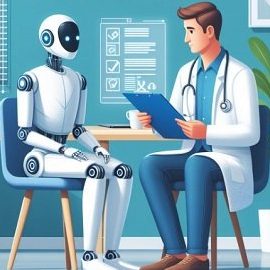Artificial Intelligence (AI) is revolutionizing the healthcare industry by enhancing diagnostic accuracy, efficiency, and accessibility. AI technologies leverage data, algorithms, and machine learning to assist medical professionals in diagnosing conditions more effectively. Here’s a detailed overview of how AI is used in healthcare diagnostics and its impact on modern medicine.
Understanding AI in Healthcare Diagnostics
What is AI in Healthcare?
Artificial Intelligence in healthcare involves the use of machine learning, deep learning, and other advanced computational methods to analyze medical data and assist in diagnosing diseases. AI systems can process vast amounts of data quickly and accurately, providing insights that might be missed by human observers. Key AI technologies in healthcare include:
- Machine Learning: Algorithms that learn from data and improve their performance over time. For example, machine learning models can analyze medical images and detect abnormalities.
- Deep Learning: A subset of machine learning that uses neural networks with many layers (hence “deep”) to identify patterns and make predictions. This is particularly useful in image recognition tasks, such as interpreting X-rays or MRIs.
- Natural Language Processing (NLP): AI techniques that enable computers to understand and process human language. NLP can be used to analyze patient records and medical literature to assist in diagnosis.
AI Diagnostic Tools
AI diagnostic tools are designed to support healthcare professionals by providing:
- Decision Support: AI systems can offer recommendations based on data analysis, helping doctors make informed decisions.
- Predictive Analytics: Predictive models can forecast the likelihood of disease onset based on patient data and risk factors.
- Automated Analysis: AI can automate the analysis of medical images, lab results, and patient data, speeding up the diagnostic process.
Applications of AI in Diagnostic Medicine
Medical Imaging
AI’s impact on medical imaging is significant, enhancing both the speed and accuracy of diagnoses:
- Image Analysis: AI algorithms can analyze medical images such as X-rays, MRIs, and CT scans to detect abnormalities like tumors, fractures, or signs of diseases. For example, AI systems have been used to detect early signs of cancer with high accuracy.
- Radiology Assistance: AI tools can assist radiologists by highlighting areas of concern in imaging studies, reducing the risk of missed diagnoses and improving workflow efficiency.
Pathology
In pathology, AI is used to analyze tissue samples and assist in the diagnosis of diseases:
- Histopathology: AI algorithms can analyze digital images of tissue samples to identify cancerous cells and other pathological conditions. This helps pathologists in making accurate diagnoses and selecting appropriate treatments.
- Automated Slide Analysis: AI can automate the process of analyzing microscope slides, providing faster results and reducing the workload for pathologists.
Predictive and Preventive Diagnostics
AI’s predictive capabilities can enhance preventive care by identifying individuals at high risk of developing certain conditions:
- Risk Assessment: AI models can analyze patient data, including genetic information, lifestyle factors, and medical history, to predict the likelihood of developing diseases such as cardiovascular conditions or diabetes.
- Personalized Medicine: AI helps in tailoring preventive measures and treatments based on individual risk profiles, leading to more personalized and effective healthcare strategies.
Benefits and Challenges of AI in Healthcare Diagnostics
Benefits
AI offers several advantages in healthcare diagnostics:
- Enhanced Accuracy: AI algorithms can detect patterns and abnormalities that may be missed by human eyes, leading to more accurate diagnoses.
- Increased Efficiency: Automation of diagnostic tasks speeds up the process, allowing healthcare professionals to focus on patient care and decision-making.
- Improved Access: AI tools can extend diagnostic capabilities to underserved areas where specialized medical expertise might be limited.
Challenges
Despite its benefits, AI in healthcare diagnostics faces several challenges:
- Data Privacy and Security: Handling sensitive medical data requires stringent privacy and security measures to protect patient information from breaches.
- Algorithm Bias: AI systems may inherit biases present in the data they are trained on, potentially leading to disparities in diagnosis and treatment outcomes.
- Integration with Existing Systems: Integrating AI tools with existing healthcare systems and workflows can be complex and require significant changes to infrastructure.
The Future of AI in Healthcare Diagnostics
Advancements in AI Technology
The future of AI in healthcare diagnostics is promising, with several advancements on the horizon:
- Improved Algorithms: Continued development of AI algorithms will enhance diagnostic accuracy and expand the range of conditions that can be detected.
- Real-Time Diagnostics: AI will enable real-time analysis of data, providing immediate insights and supporting timely decision-making.
- Integration with Wearables: Combining AI with wearable health technologies will offer continuous monitoring and early detection of health issues.
Ethical and Regulatory Considerations
The growth of AI in healthcare also brings ethical and regulatory considerations:
- Ethical Use: Ensuring that AI technologies are used ethically and do not exacerbate existing health disparities is crucial.
- Regulatory Frameworks: Developing and implementing regulatory frameworks to oversee the use of AI in diagnostics will ensure that these technologies meet safety and efficacy standards.
Artificial Intelligence is transforming healthcare diagnostics by enhancing accuracy, efficiency, and accessibility. From analyzing medical images and pathology slides to predicting disease risk and personalizing care, AI technologies offer significant benefits to both patients and healthcare providers. As AI continues to advance, it will play an increasingly important role in modern medicine, offering new opportunities for improving health outcomes and advancing the future of healthcare.

